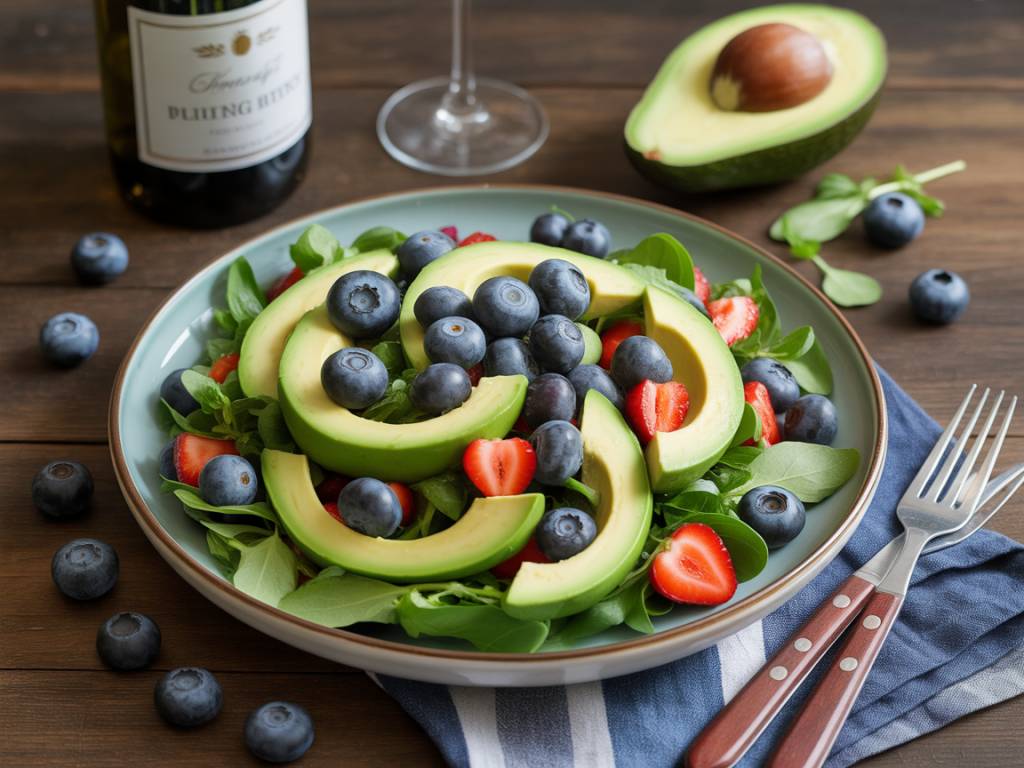
Avocado blueberry salad and wine: a fresh food pairing guide
Why Avocado and Blueberry Salad Deserves a Spot on Your Pairing Radar
At first glance, avocado and blueberry may seem like an unlikely duo. One’s rich and buttery; the other, sharp and sweet. But together, they form a surprisingly balanced symphony of texture and flavor. Add to that a citrus vinaigrette, a handful of baby greens, and something crunchy—say, toasted almonds or pumpkin seeds—and you’ve got a salad that feels indulgent, yet refreshingly light. Now here’s the question that inevitably follows: what wine do you serve with that?
As a former sommelier turned winery consultant, I’ve learned that some of the most memorable pairings come from curiosity, not convention. In this guide, let’s explore what makes this salad tick and how to complement it with wines that highlight, not overpower, its vibrant nature.
The Flavor Profile of Avocado Blueberry Salad
Before reaching into the wine rack, it’s essential to break down what’s happening on the plate. A well-prepared avocado blueberry salad typically combines:
- Ripe avocado: Smooth, creamy, and slightly nutty. It softens and enriches every bite.
- Fresh blueberries: Tart-sweet with a juicy pop. Their natural acidity is key to lifting the salad.
- Leafy greens: Common choices include arugula, spinach, or mixed baby lettuces, each contributing light bitterness and texture.
- Citrus vinaigrette: Think lemon or orange-based dressings with a hint of honey or Dijon to bind the flavors.
- Textural add-ons: Toasted nuts or seeds, crumbled goat cheese, or sliced red onions for contrast and crunch.
The flavor balance rests on freshness, acidity, and creaminess. A successful wine pairing should echo that same equation: crisp acidity, aromatic lift, and enough structure to bridge the salad’s creamy and herbal components.
Start with the Basics: Why Acidity Leads the Way
Let’s be clear: richness alone doesn’t demand full-bodied wine. In fact, pairing heavy reds with avocado-based salads often leads to clashing outcomes—too much tannin, not enough lift. What this salad needs is a partner with mouthwatering acidity.
Think zesty whites and light rosés. Wines that cleanse the palate, amplify fruit freshness, and respect delicate textures. If you’re tempted by a red, it needs to be chillable, low in tannin, and high in aromatics. We’ll cover a few options below.
Top Wine Pairings for Avocado Blueberry Salad
Sauvignon Blanc: The Go-To Pick
This is the safety net of salad pairings, and with good reason. A vibrant Sauvignon Blanc—especially from cooler climates like New Zealand’s Marlborough or Washington’s Columbia Valley—has citrusy acidity, grassy undertones, and zingy energy. It mirrors the vinaigrette’s brightness while lifting the herbal and berry elements of the dish.
Pro Tip: If you’re including goat cheese or have fresh herbs in the salad, this match becomes even more cohesive.
Albariño: A Coastal Favorite
Coming from the Atlantic coast of Spain and northern Portugal, Albariño brings saline notes, ripe stone fruit, and bright citrus. It complements the blueberries’ tanginess and avocado’s silkiness without overwhelming subtleties.
This pairing sings especially well if your salad leans into seafood-style enhancements—think shrimp or grilled scallops tossed in.
Dry Rosé: Fruity, Fresh, and Versatile
Rosé doesn’t just feel like summer—it tastes like it. A dry rosé from Provence or Sonoma offers red berry fruit, gentle acidity, and a crisp finish. The subtle fruitiness echoes the blueberries without turning syrupy, especially if your vinaigrette skews toward orange or blood orange zest.
Avoid overly sweet or blush-style rosés; you want structure and cut, not cotton candy.
Grüner Veltliner: Austria’s Unsung Hero
If you’re ready to go slightly off the beaten path, Grüner Veltliner is a phenomenal match. It’s peppery, citrusy, and brisk—like Sauvignon Blanc with a savory edge. It plays nicely with raw greens, nuts, and avocado, providing both brightness and subtle complexity.
For those who find Sauvignon Blanc a touch too sharp, Grüner tempers the edge while maintaining clarity.
Chilled Gamay or Pinot Noir: If You Must Go Red
We get it—some folks just love red wine. If you’re among them, steer into the lighter lane. A chilled Gamay (think Beaujolais-Villages) or an Oregon Pinot Noir can work, but only if the rest of the dish allows it. For instance, if you’ve added grilled chicken or earthy roasted beets, these reds can bring fruitiness and subtle spice without competing for control.
Always chill lightly—15 minutes in the fridge before serving is usually sufficient to tighten the flavors and lift the pairing.
Customizing the Pairing Based on Salad Variations
Much like winemaking, salad composition is all about intention. Here’s how wine choices can adapt based on a few common salad twists:
- With Goat Cheese or Feta: Go for Sauvignon Blanc, Grüner Veltliner, or even a sparking brut to echo the tangy creaminess.
- With Honey-Lemon Dressing: Choose off-dry Riesling or a highly aromatic Viognier—wines with perfume and just a hint of residual sugar to harmonize the sweet-tart balance.
- With Protein Additions: Grilled chicken or salmon? Depending on seasoning, this might nudge you toward a fuller-bodied white like Chardonnay (unoaked or lightly oaked) or even an aged rosé.
The Role of Texture in Pairing Success
People often focus on flavor, but texture is just as critical—especially with avocado. The mouth-coating nature of avocado demands a wine that refreshes. That’s why high-acid, lean-bodied wines work so well. They wipe the palate clean while allowing the salad’s creaminess to shine, not smother.
If you’re using a vinaigrette with a stronger pronounced oil (like avocado or walnut oil), watch for wines with bitter or almond notes; it can be complementary, but also risky if bitterness gets amplified.
Serving Tips for Maximum Harmony
- Keep the salad cold, but not fridge-frozen: Extreme cold dulls the flavors of blueberries and the subtlety of avocado.
- Dress just before serving: This keeps the greens crisp and the avocado from browning.
- Chill your wine to appropriate temps: Whites and rosés should be served cool (45–55°F), reds slightly chilled (55–60°F) to keep the freshness front and center.
When in Doubt, Sparkling Saves the Day
Having trouble deciding on a wine with multiple salad ingredients in play? Bubbles are your friend. Try a brut sparkling wine—like a dry Prosecco, Cava, or domestic brut from Oregon or California. The effervescence lifts the dish, the acidity energizes the flavor profile, and the universal appeal of bubbles sets a celebratory tone even for a Tuesday lunch.
Final Thoughts: An Everyday Pairing with Upscale Potential
An avocado blueberry salad might feel like a modern invention, but its beauty lies in elemental balance. Freshness meets creaminess. Sweet meets bright. Crunch meets silk. And with the right wine, those contrasts become conversation.
The takeaway? You don’t need foie gras or filet mignon to create a sommelier-approved wine pairing. An everyday salad, built with intention and served with the right bottle, can create an experience that’s anything but ordinary. Consider this your invitation to explore, taste, and most of all—enjoy the surprising harmony of humble ingredients done right.




